|
1 High Street/Sea Street/Harbour Street
Whitstable
01227 280617
http://www.thedukeinwhitstable.co.uk
https://whatpub.com/duke-of-cumberland
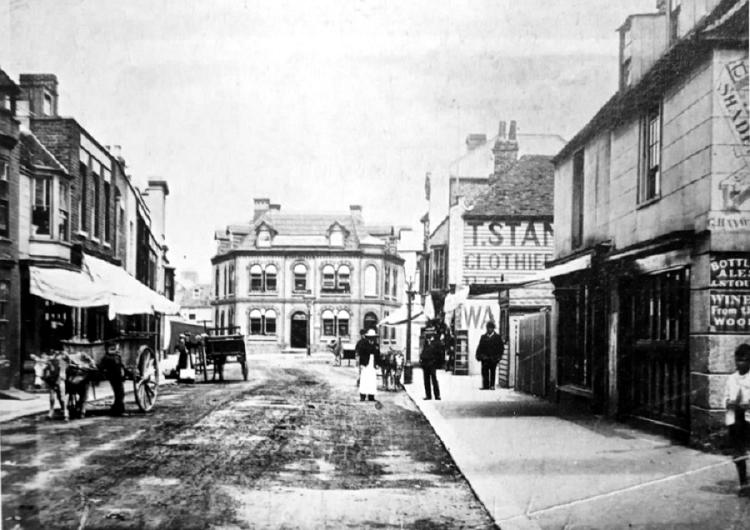
Above postcard, circa 1900, kindly sent by Rory Kehoe. |
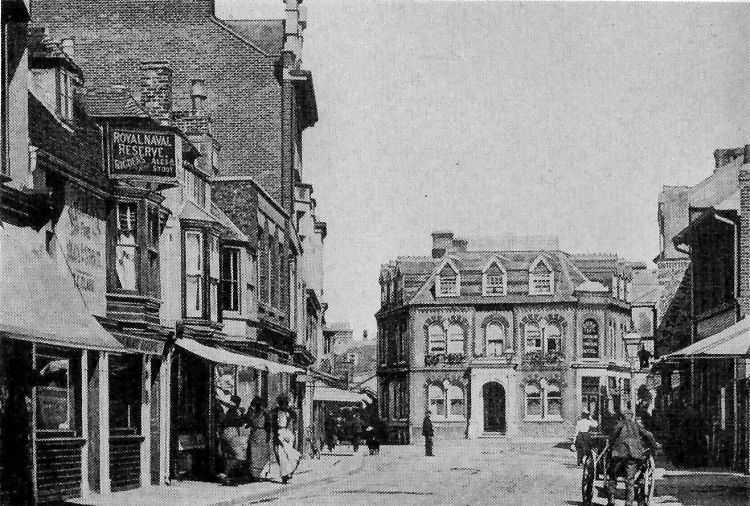
Above photo date unknown. Also showing the "Duke
of Cumberland" centre. Also showing the "Royal
Naval Reserve" (left). |
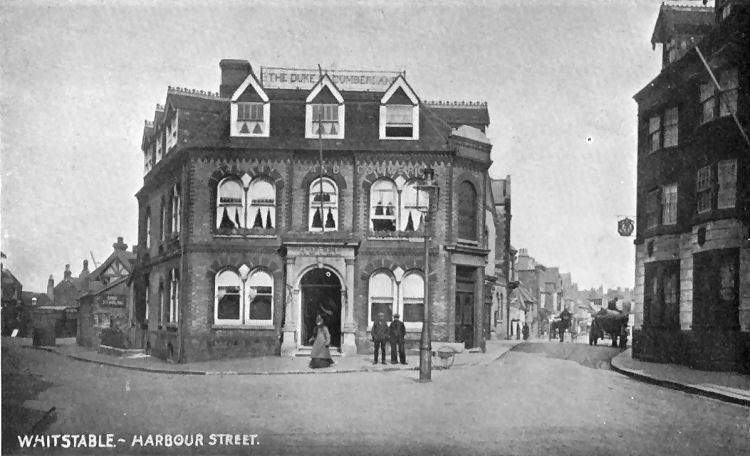
Above postcard, date unknown. |
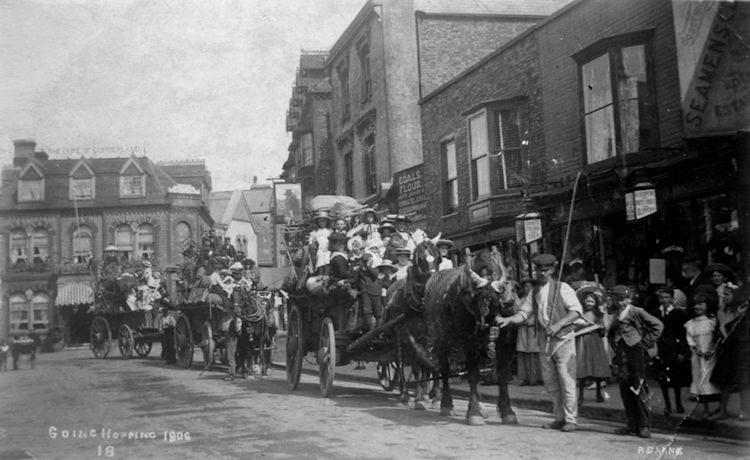
Above postcard 1906, kindly sent by Rory Kehoe. It's probably fair to
presume that the folks on the wagons had taken a train down from London,
all set for a couple of weeks hop picking. Odd though, in that the most
direct route from the railway station to Borstal Hill and the farms
south of Whitstable, would not pass along the High Street. Still, the
camera never lies and the photograph shows the hoppers' wagons passing
the "Duke of Cumberland" and "Bear
and Key Hotel." |

Above photo, date unknown, by Douglas West. |
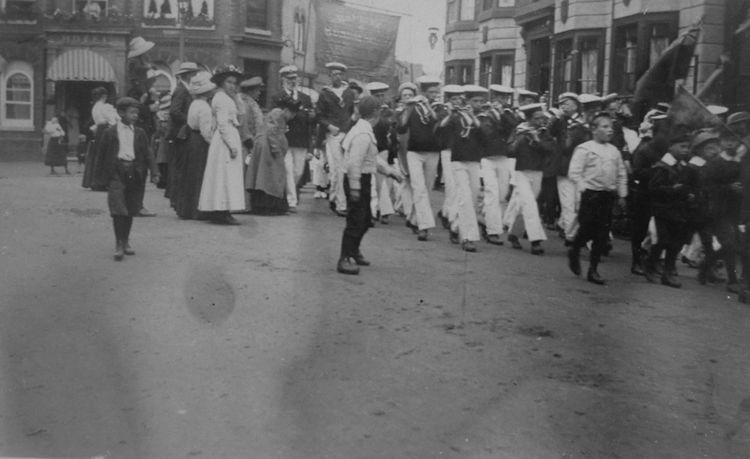
Above photo, circa 1907, kindly sent by Rory Kehoe. A group of Sunday
School children on their way to a picnic, accompanied by what looks to
be a Sea Scouts' fife and drum band. The pub is left of centre and to
its right, behind the band, is the "Bear
& Key Hotel." |
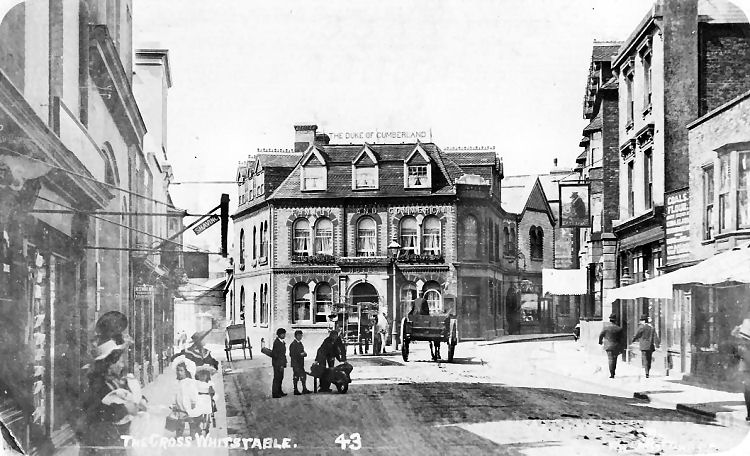
Above showing the Duke of Cumberland circa 1908. Also showing the "Bear
and Key" right. |
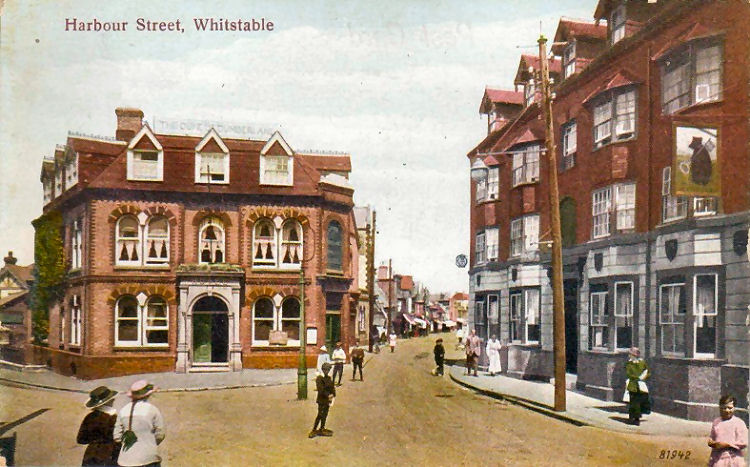
Above postcard, 1910, kindly sent by Rory Kehoe. |
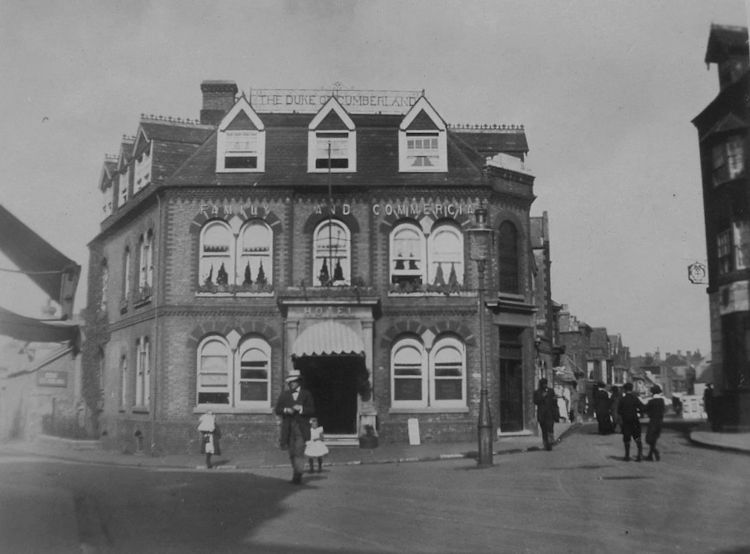
Above photo, circa 1911, kindly sent by Rory Kehoe.
The pub is still a Shepherd Neame house and since getting a complete
makeover in 2023, offers guests boutique-style accommodation in
well-appointed rooms. |
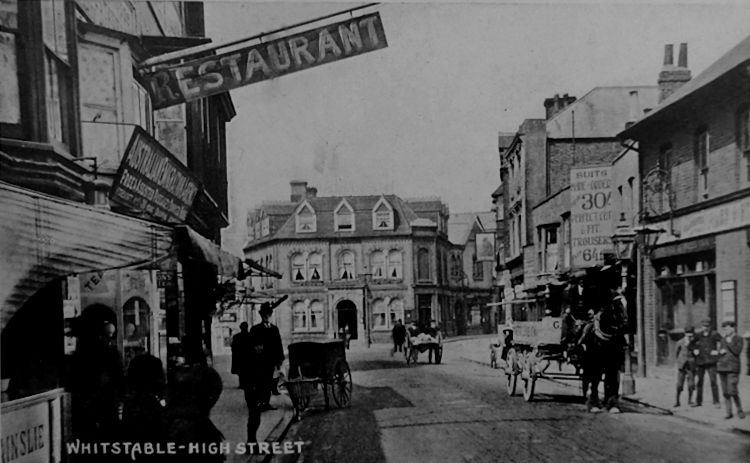
Above postcard, circa 1912, kindly sent by Rory Kehoe. |
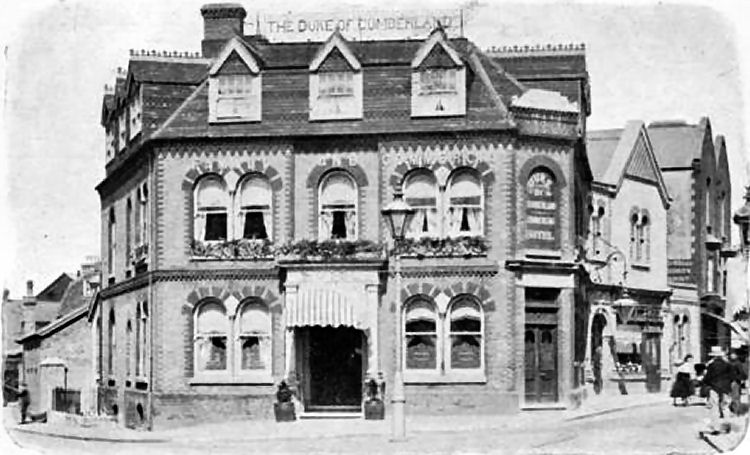
Above photo, circa 1920, kindly sent by Rory Kehoe. |
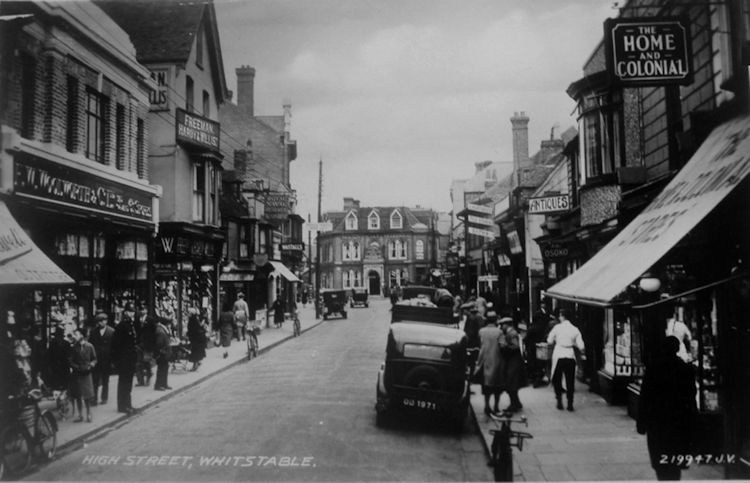
Above postcard circa 1929, kindly sent by Rory Kehoe. Looking north, a
view of Whitstable's busy High Street, up to the "Duke of Cumberland".
Unlike these days, there's not a single bubble tea shop, tanning salon,
nail bar, tattoo parlour, or bookies to be seen! In amongst the, once
familiar but now lost, High Street names, including F.W. Woolworth, Home
& Colonial Stores and Freeman, Hardy & Willis, is the swing sign of the
"Royal Naval Reserve." Formerly a Rigden's tied house, the "Royal Navy
Reserve" advertises "Kent's Best" which was the strap line for the
merged (since 1922) George Beer & Rigden's Faversham brewery. |
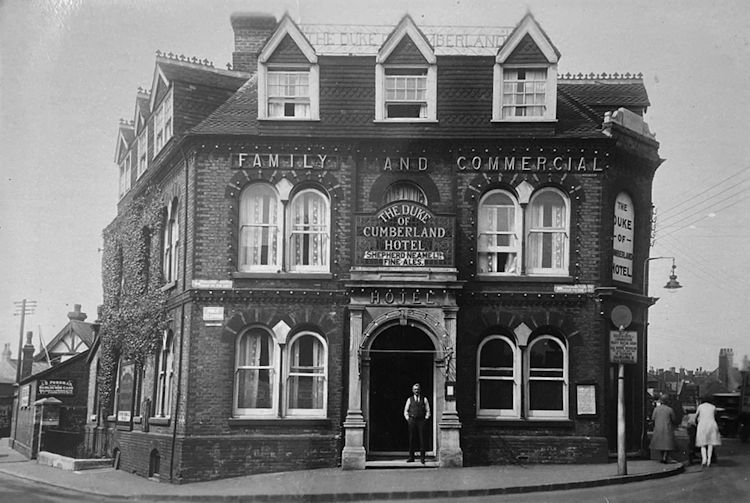
Above photo, circa 1931, kindly sent by Rory. Showing the pub (then, as
now 2024) as a Shepherd Neame house, with licensee Lionel Marden
standing at the door. |
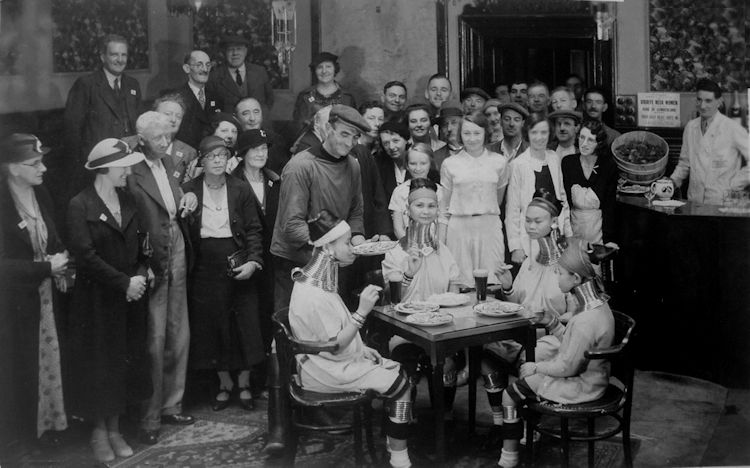
Above photo, 10 September 1936, kindly sent by Rory Kehoe. Enjoying
their supper at the pub, these "giraffe-neck" ladies are likely to have
been members of Kayan community, which is largely to be found in the
eastern part of Burma. These days, the practice of neck-ringing is
officially discouraged but still continues in some of the more
traditional Kayan communities. Most of the people in the bar are wearing
a lapel badge, so this occasion may have been some kind of charitable
fund-raising event. |
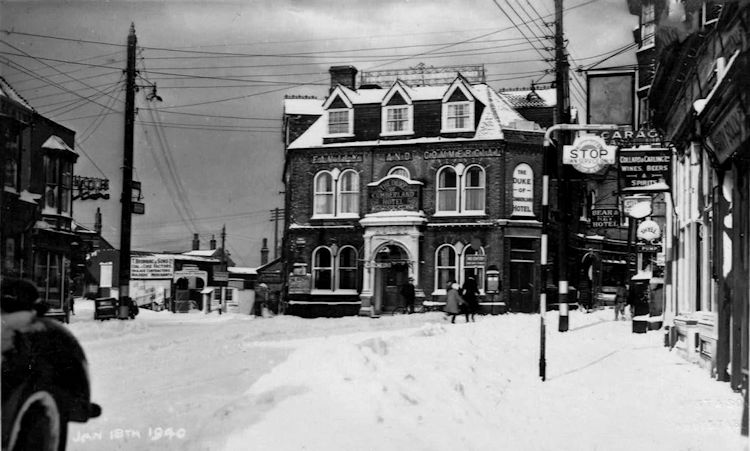
Above photo, circa 1940. |
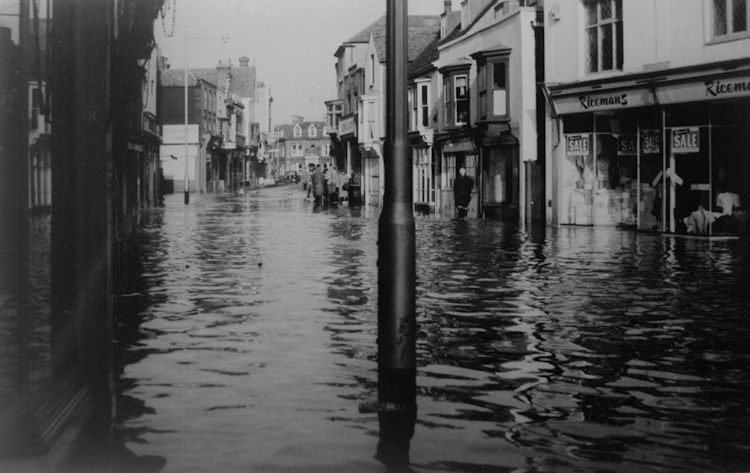
Above photo, 1953, kindly sent by Rory Kehoe. Probably taken on 1st
February 1953, this image bears sad witness to the serious flooding,
which followed the devastating storm surge of the previous day. At the
far end of the High Street, the pub looks slightly less affected than
neighbouring properties but doubtless still required pumping out. |
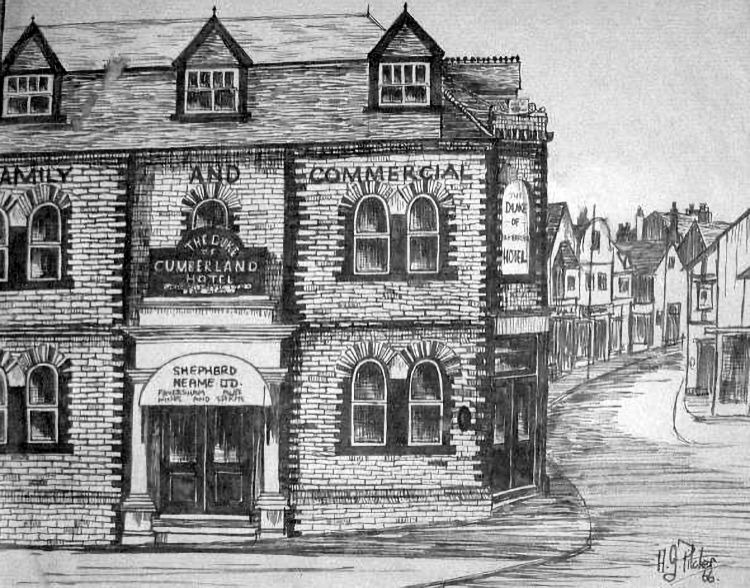
Above drawing by H G Pitcher 1966. |
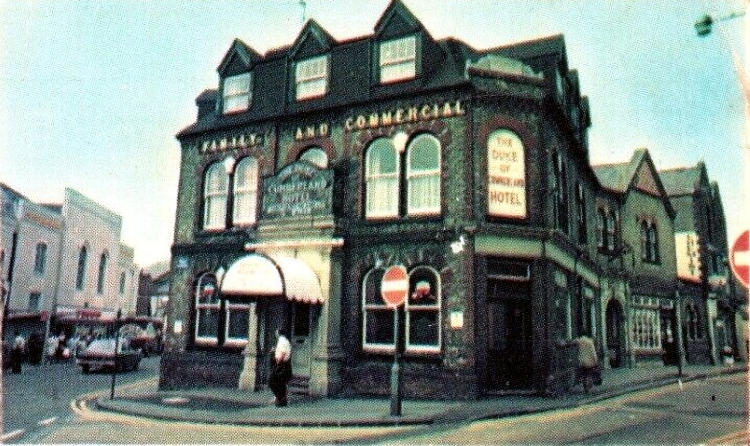
Above postcard, circa 1979, kindly sent by Rory Kehoe. |
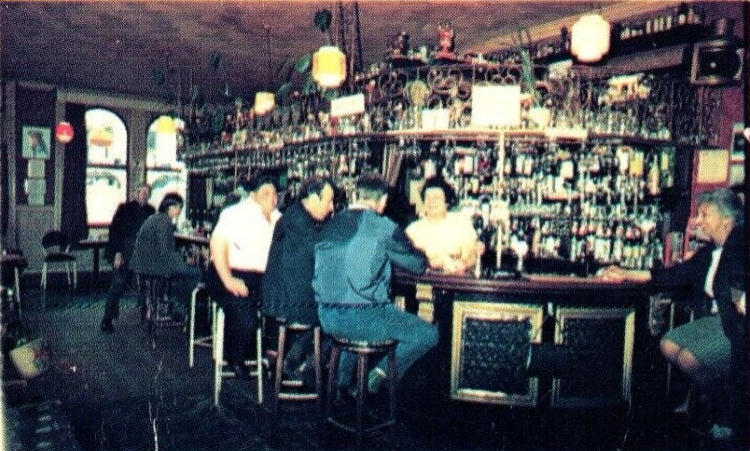
Above postcard, circa 1979, kindly sent by Rory Kehoe. |
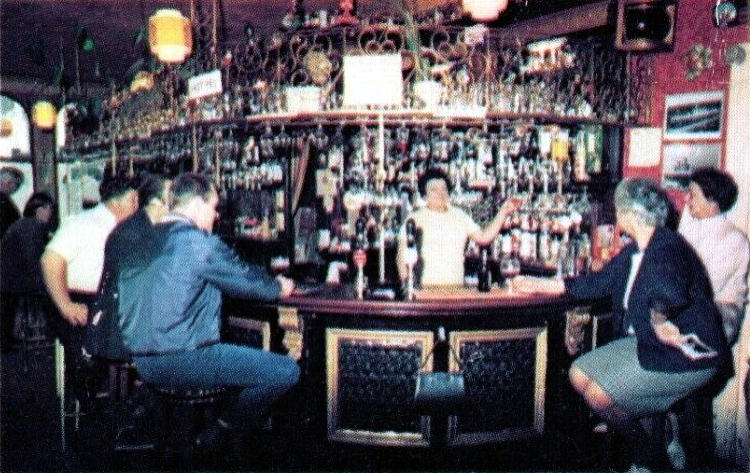
Above postcard, circa 1979, kindly sent by Rory Kehoe. |
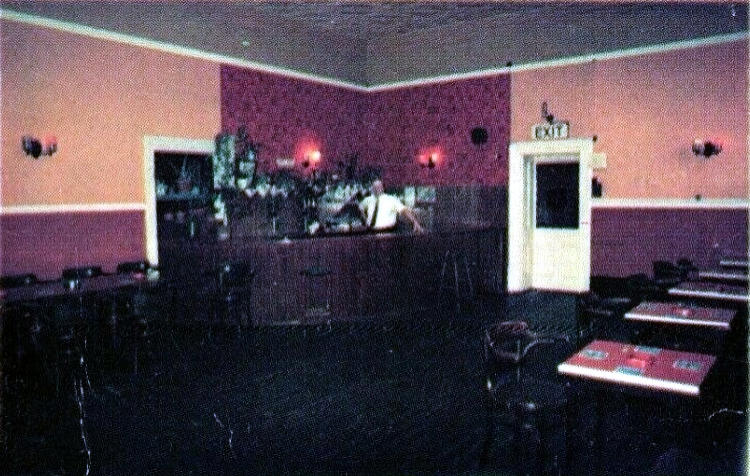
Above postcard, circa 1979, kindly sent by Rory Kehoe. |
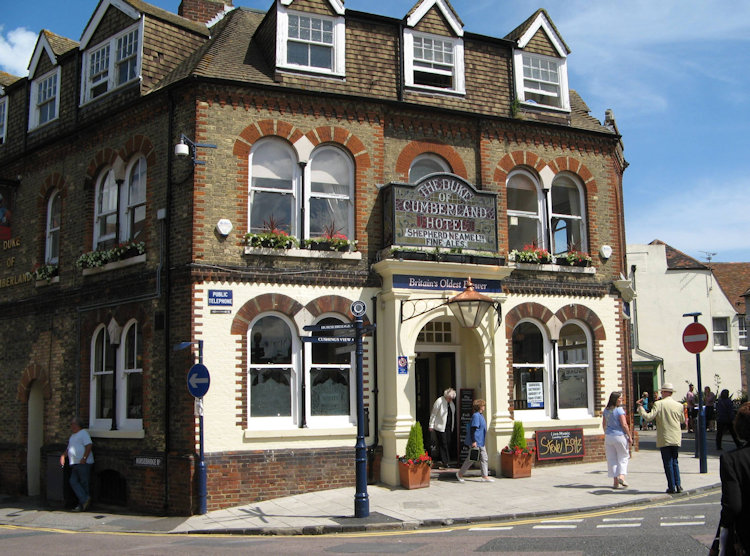
Above photo, 28 July 2007, by Jim Ashby. |

Above photo 2009 by Oast House Archive
Creative Commons Licence.
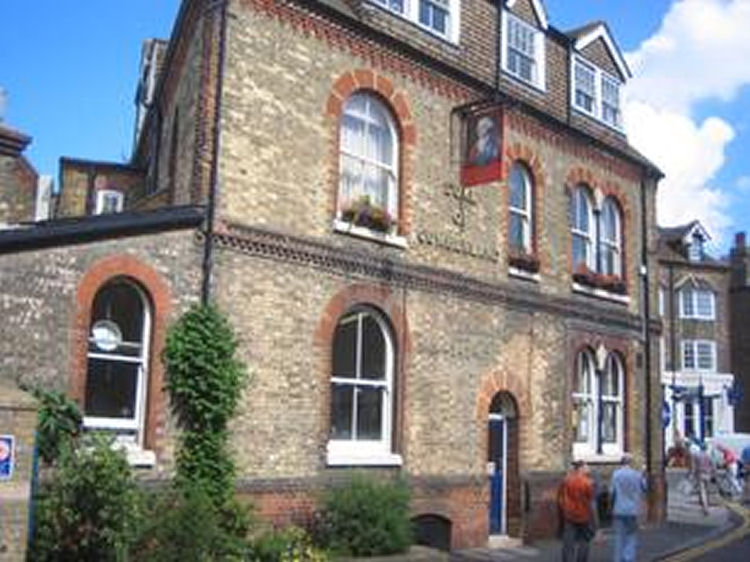
Above pictures taken from
www.beerintheevening.com 2014. |
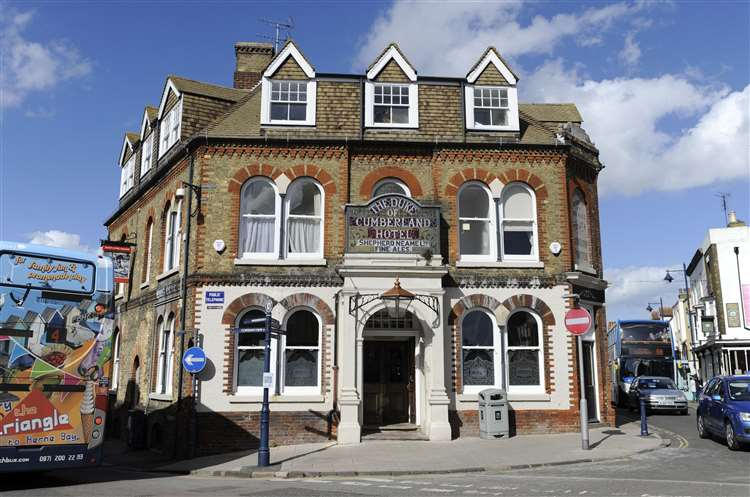
Above photo 2023 by Tony Flashman. |

Above photo 2023, by Shepherd Neame. |
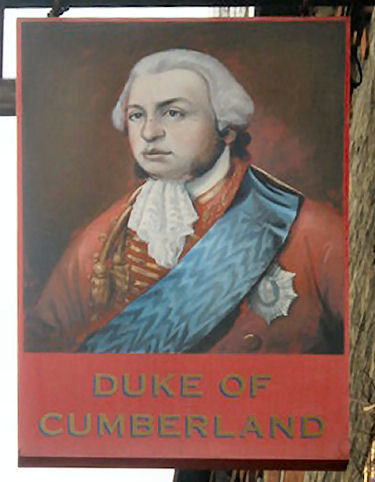 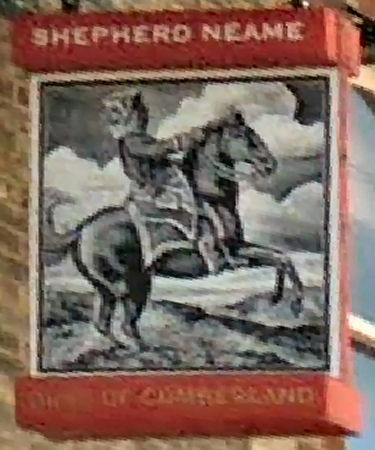
Above sign left, 2009. Sign right, 2019. |
|
|
A Grade II listed building, there has been an inn on this site for more
than 300 years. Known as the "Noah's
Ark" until 1747, Landlord Robert Chandler renamed it "Duke
William" in honour of the Duke of Cumberland who, a year earlier, had
crushed the Scottish rebellion at Culloden.
In 1748 it became The Duke of Cumberland and was used as the headquarters
for the oyster and dredger men. Fire swept through the building in 1866 and
it was rebuilt in 1878 before being bought by Shepherd Neame.
It was the headquarters of the Oyster Dredgermen whose annual Water
Court was held in an upstairs room.
In 1898, licensee Charles Gurr was also described as being a wine and
spirit merchant.
Now also contains the Salt Marsh restaurant.
|
Kent Gazette, 28 November 1778.
Abraham Bailey, from Canterbury, having taken the house, known by the
sign of the "Duke of Cumberland," at Whitstable, begs leave to acquaint
the public, that he has laid in a stock of good beer and other liquors,
and that be exceedingly obliged by the favours of his friends custom.
If good usage and gentle accommodation can anyway merit their attention,
he flatters himself that he shall be able to answer their expectation.
|
|
Kentish Gazette, 20 July, 1804.
Estates at Whitstable and Seasalter.
To be SOLD by AUCTION, By Mr. CHARLE'S POUT,
At Mr. Kitchinham’s, the "Duke’s Head,"
(sic) at Whitstable, on Monday, 23rd July, 1804, at four
o’clock in the afternoon, under such conditions as will he then
produced.
Lot 1. A Freehold Piece of Land, very desirable for budding,
being part of the Salt Grounds, measuring in front 338 feet, and in
depth from the foot of the wall to the beach.
Lot 2. A further part of the same ground, containing by
admeasurement 214 feet in front, and in depth as above.
Lot 3. A further part of the said Salt Grounds contain by
admeasurement 365 feet in front, and in depth as above.
Lot 4. A Piece of Leasehold Ground, held by lease from the Dean
and Chapter of Christ Church, Canterbury called the Salts, lying
south-west of the Salt-pans, and occasionally, at high tides,
overflowed by the sea, containing by estimation 6 acres.
Lot 5. A part of the Cliff Land, adjoining the further sea wall
of Mr. Foord, also leasehold, at the same as now stumped off, at per
acre, and to measure no further than the stock can feed or graze on.
Lot 6. A further part of the same Leasehold Cliff Land, adjoining
Lot 3, and extending to Scab's Acre, at the end of Mr. Browning's
wheat held, in a line with the hedge down to the dike parting the
same from the Salts.
Lot 7. A further part of the same Leasehold Cliff Land,
continuing from the south-west side of Scab's acre to the main road
down the cliff, next Mr. Beer's land.
Lot 8. The Salts from the dike at the foot of the cliff to high
water mark.
The above Lands are in the parishes of Whitstable and Seasalter,
or one of them, in the county of Kent.
N. B. The purchases of Lot 5 is, at his own expense, to make and
maintain a post and real fence, of not less than four rails, from
the top of the cliff to the bottom, to divide Lots 5 and 6; and the
purchaser of Lot 6 is, at his own expense, to make and maintain a
like fence, to divide Lots 6. and 7.
For particulars enquire of Mr. Hodges, Solicitor, Canterbury.
|
|
From an email received, 30 December 2022. The landlord between Abraham
Bailey and Walter Foreman was William Kitchingham (sometimes Kitchenham).
He was born in 1768 and died in Whitstable in 1846. His second wife was
Sarah Lawson b. Seasalter in 1779. Her sister Hannah married Walter
Foreman, the landlord from 1828. I found an auction notice in the KM pub
28 Jul 1807 (below) which says 'Mr Kitchener's Duke of Cumberland'. It
didn't take me long to work out who he was. The Lawsons and Foremans
were already all on my husband's tree. William White Foreman, landlord
from 1861 was first cousin once removed with Walter Foreman (his dad's
first cousin).
Alfred Mann, b. 1819 in London married Emily Ann Foreman, sister of
William White Foreman. He was actually a merchant seaman/master. In fact
the common theme seems to be that 99% of them were either mariners,
dredgers or farmers who conveniently ran a pub for a few years - very
suspicious! So anyway, you can see that it was a bit of a dynasty.
Cheers,
Ali Dilnutt.
|
|
From the Kent Messenger, July 1807.
Leasehold Farms. County of Kent.
To be sold by auction, by Mr. Langdon.
At Mr. Kitchenener's, the "Duke of Cumberland," Whitstable, on
Friday, July 31st, 1807, at 11 o'clock, by direction of the Executrix of
Mr. Stephen Salisbury, deceased, in three lots.
Lot 1. Comprises of a substantial well-built farmhouse known by the
name of St. Annes barn, with outhouses stabling, &c. perfectly adapted
to an estate of this eligible description;........
|
|
Kentish Weekly Post or Canterbury Journal, Tuesday 1 September 1812.
For the benefit of creditors. To be sold by auction.
By W. Whorlow, at the "Duke of Cumberland Inn," Whitstable, Kent, on
Monday the 7th day of September, 1812, at 2 o'clock in the forenoon.
The life interest of Mr. John Lothes, a bankrupt, 42 years of age, of
and in one undivided Moiety, or half part of an estate, situated in the
parish of Whitstable, in the county of Kent, called Tankerton Farm,
containing 26a. 3r. 39p.mMore or less, and is in the occupation of Mr.
Robert Anderson, whose lease will expire at Michaelmas 1815.
|
|
Kentish Gazette, 4 April 1854.
Hawking without a License.
Mr. James was brought up by Superintendent Walker, and charges with
hawking goods without a licence.
It appeared that the defendant and taken a large room at the "Duke of
Cumberland Inn," Whitstable, which he had fitted up as a bizarre for the
sale of fancy articles, with the usual accompaniment of the lucky bag,
&c.
There was also a vocal and instrumental concert. It was called the
"Royal Albert Bizarre."
The Superintendent deposed on these facts, and the accused pleaded
guilty to the charge.
Order to pay a fine of £10. and 14s. 6d. costs.
Paid.
The bench cautioned him against the repetition of a similar offence, and
especially against the practice of gambling with a "lucky bag," as it is
termed.
|
|
From the Whitstable Times and Herne Bay Herald. 8 June 1867. Price 1d.
The Magistrates granted an authority to William Lester to sell
spirituous liquors in the “Duke of Cumberland,” Whitstable.
|
|
From the Whitstable Times and Herne Bay Herald. 31 August 1867. Price 1d.
FALL FROM A LADDER
A boy about 10 years of age, named Charles Dide, met with a shocking
accident here on Wednesday last by falling from a ladder. He was at
work for his uncle, Mr. Bennett, at the "Duke of Cumberland,"
Whitstable, as plasterer's boy, and unknown to the workmen carried a
pail of water up a ladder, the water being intended for use at the top
of the house. He had ascended between 20 and 30 feet, when from some
cause his foot slipped, and he fell to the ground, sustaining very
severe injury to the shoulder joint. Mr. Williams and Mr. Mann attended
him, and he was afterwards removed to the Kent and Canterbury Hospital. |
|
Canterbury Journal, Kentish Times and Farmers' Gazette, Saturday 11 June 1887.
Notice. Charles Gurr.
Proprietor of the "Duke of Cumberland Hotel," Whitstable.
Begs to inform his numerous friends and patrons, that the report which
has been circulated in the County, that he is about to leave the "Duke
of Cumberland," is FALSE, and that it has evidently been made up by some
malicious person with the intention of damaging him in his business.
|
|
From the Farmer's Gazette, Saturday 24 June 1893.
Narrow escape.
A narrow escape from drowning, in which two persons, one belonging to
Whitstable and the other to Faversham, were concerned, took place in
Whitstable Bay, on Saturday last. It appears that Mr. C. Gurr, jun., son
of Mr. Gurr, of the "Duke of Cumberland Hotel," Whitstable, rowed out
for a day's fishing, taking with him Miss Nora Eltham, 12 years of age,
daughter of Mr. C. Eltham, of the "Dolphin Hotel," Faversham, who was on
a visit at his father's house. The boat was in due course anchored in
the bay, when the barge Alabama, of Faversham, belonging to Mr. J. M.
Goldfinch, collided with and pressed it beneath the water. Mr. Gurr
immediately seized hold of the young lady and held her in such a
position that she could cling to the barge, and the crew promptly
dragged her on board. Meanwhile, the boat going from under him. Mr. Gurr
himself was precipitated into the water, but being a swimmer, he was
able to keep himself afloat until the mate rowed to his assistance in
the barge's boat.
|
|
From the Whitstable Times, 15 February, 1902.
WHITSTABLE—FINED FOR DRUNKENNESS.
Henry George, was summoned for being drunk at Whitstable on February
5th, and also with being of disorderly behaviour at the same time and
place.
The defendant was represented by Mr. R. M. Mercer and pleaded not
guilty.
Sergt Joy of Whitstable stated that at 10.45 on the night of February
5th, he was at the "Cross" at Whitstable with P.C. Brookes, when the
police constable called his attention to defendant who was trying to
turn the handle of the door of the “Duke of Cumberland.” Witness saw
that defendant was very drunk. He came towards witness and then
commenced to pitch first on his toes and then on his heels. He said in a
very thick voice “Sir, can I get a rest.” Witness told him to go to his
lodgings, defendant then said “I shall when I ------- well like.” Some
gentleman who was passing said to defendant “Go home Harry there's a
good fellow.” Defendant repeated his bad language. Defendant then went
to “Bear and Key Hotel.” Two
minutes later witness saw defendant staggering about in High Street. He
went up Bonner's Passage which led to the “Tradesman’s Club.” He
staggered from one side of the road to the other. When he was in
Bonner's Passage defendant behaved disorderly. Witness subsequently
arrested him and took him to the police station. Defendant raved for the
best part of the night and was delirious. Witness bailed him out in the
morning.
In reply to Mr. Mercer, witness stated that defendant asked for a
medical man. Witness did not know defendant was a man of property. He
did not let him have a medical man because he had only four-pence in his
pockets. Defendant asked that his wife might he acquainted with the fact
that he was locked up. Witness thought if defendant had a few hours from
drink it would do him good. (Laughter.) Witness took defendants boots
off, but he had his socks left on in the stone cell. That was the usual
practice. It was the usual practice of intoxicated people to ask for
their friends. Witness had read what the Recorder of London had said
about examining people for scars and measuring them if only charged with
drunkenness. Defendant did ask if he was in on a murder charge. Witness
said he had received no order that he was to discontinue measuring and
examining defendants.
P. C. Brooks corroborated the evidence of Sergt. Joy.
Corporal Lambkin also gave evidence.
Mr. Mercer said he wished to ventilate the fact of men who were only
charged with drunkenness being subject to measurement and examination.
Sergt. Joy had acted under directions which were very wrong. He
contended that when the defendant asked to see a medical man he should
have been allowed to see one and that his client had been subjected to
improper treatment. The police ought not to have examined defendant for
scars as they did.
The defendant gave evidence on oath. He stated that he lived at Essex
Street, Whitstable. He stated that he lived at Essex Street, Whitstable.
He went to a Druids lodge on the evening in question and only had two
pints of beer. He assisted in closing the lodge. He went across to the “Bear
and Key” and had a pint of beer. He then went up the street and soon
after he was arrested. He was put into a cold cell and in the morning he
was given a slate on which was put down his height, 5 feet 8 1/2 inches.
George Kirkby, schoolmaster of Whitstable Board School, stated that
he was at the “Bear and Key”
on the evening when the defendant came in and had a glass of ale. He
walked away from the bar and when he went he said “Good Night
gentlemen.” He seemed all right then. Witness was astounded to hear a
minute or two later the defendant had been arrested.
Percy Rigden, Inspector at the Railway station and who was secretary
of the Druids Lodge, at which defendant attended, stated that he saw the
defendant leave between 10.30 and 10.45, and he was then sober. He was
surprised when he heard of defendant’s arrest.
Albert King, landlord of the “Duke of Cumberland,” at which house the
Druids meeting was held, also stated that defendant walked out of his
house all right.
Richard Gurr, a butcher, living at Canterbury Road, Whitstable,
stated that he was presiding officer and he noticed nothing wrong with
defendant at the Druids meeting.
The Magistrates considered the case proved and fined defendant 5s.
and 15s. 4d costs.
|
|
From the Whitstable Times, 19 July, 1902.
ST. AUGUSTINE’S PETTY SESSIONS.
Saturday, July 12th.—Before Lieutenant Colonel Dickenson (in the chair).
Captain T. Lambert, Mr. W. A. Lochee, Mr. J. Bowes, Mr. Marshall, Mr.
French, C.B., and Colonel Lourie, C.B.
WHITSTABLE TRANSFER OF LICENSES.
An application was made for a temporary transfer of the licence of the
“Duke of Cumberland,” Whitstable, from Sarah Anne King to Charles
Greensted of Canterbury.
The application was granted.
|
|
From the Whitstable Times, 6 December, 1902.
INQUEST ON A CHILD. THE GUARDIANS CENSURED.
On Wednesday afternoon the East Kent Coroner Mr. R. M. Mercer held an
inquest at the “Duke of Cumberland Hotel,” on the body of Reginald
Taylor, aged 4 years.
Mr. Manooch acted as foreman of the jury.
Laura Huttin, a single woman, aged 28, of 2, Red Lion Square,
Whitstable, gave evidence that the child had been given into her custody
by a woman named Taylor. She fetched it from Wandsworth and received £6
with it. Witness obtained a living by cleaning doorsteps, and
occasionally went to Herne Bay to perform work. She had lived with a
man, but he had now left her. Her room cost her 1s. 6d. per week. The
person from whom she received the child was, about 35 years of age. She
had applied to Mr. Dilnot for relief, but he told her to see the
Guardians of Blean Union. This she did and was told she must enter the
House. She refused to do this. The child’s age she believed was about 4.
Death took place at about a quarter to nine on Monday evening. She had
not resided with the man previously referred to for the last five
months. Witness had another adopted child and also one of her own. When
the child was taken ill she saw Mr. Dilnot and Dr. Hayward came and
attended the child and ordered it to be given milk.
Dr. Hayward then gave evidence as to being called in to see the child.
It was in a very bad state. The child was suffering from severe chill
and slight congestion of the lungs. He gave an order for milk to be
given to it and also sent some samples of farinaceous foods from his
surgery. He found that the woman had used a good part of it. The child
was not able to take much, but it had taken as much as it could. The
child was in a very emaciated condition, and the actual cause of death
was tuberculosis of the glands of the abdomen brought on by the
congestion of the lungs and other causes. He did not know whether or not
the child had been registered under the Infants’ Lives Protection Act.
Lillie Woolmer, of 2, Red Lion Square, was then called. The woman Huttin
lodged with her. She stated that the woman lived very poorly and that
she (witness) had helped her as well as she could. Her husband was in
the hospital. She had applied to the Guardians for temporary relief, and
they had offered to lend her 5s.
The Coroner remarked that he had never heard of a similar case.
Florence Moor, of 2, Lower Island, stated that three months ago she
lodged with the last witness and knew the woman Huttin, who was also
staying in the house at the time.
Asked by the Coroner if she had ever noticed the deceased child treated
differently to the others, she, after some hesitation, stated that she
had. The other two children were given jam and bread and this one had
been given bread and butter.
Laura Huttin was re-called and adhered to all her former statements. In
explanation of the above difference of treatment she said that when she
received the child she was told not to give it fruit or anything of that
nature as its bowels were weak.
On being questioned Dr. Hayward said this was no doubt true.
Mr. Dilnot, the relieving officer, spoke of the case as it came under
his notice. The Guardians did not give the woman out-door relief because
she was receiving 7s. per week.
On being questioned by the Coroner as to the conduct of the Board in
reference to the case, he said they were simply following out the rules
under which they worked. At the time of application he gave the woman a
trifle out of his own pocket. Relief, in the shape of 3s. worth of
groceries, 1 gallon bread, and 1 cwt. coals was sent on Monday last at 4
o’clock in the afternoon.
The Coroner remarked that this was too late as the child died five hours
later.
In summing up he said he considered that the way in which the Board had
treated the case was perfectly monstrous. In saying that he was not
imputing any blame to Mr. Dilnot.
The jury, after a consultation, returned a verdict of Death from Natural
Causes, and added as a rider that the Guardians were to blame in all
cases of this description in not giving out-door relief. They also
expressed an opinion that there should be a resident relieving officer
at Whitstable.
|
|
From Whitstable Times and Herne Bay Herald 10 September 1910.
LICENSING BUSINESS AT ST. AUGUSTINE'S PETTY SESSIONS.
TRANSFERS AND AN EXTENSION.
The magistrates granted an hour's extension for Thursday, September
8th, on the occasion of a banquet to Mrs. Weston of the "Duke of
Cumberland," Whitstable. |
|
Whitstable Times and Herne Bay Herald, Saturday 7 December 1935.
Changing Hotels.
The Magistrates at St Augustine's Petty sessions, Canterbury, on
Wednesday morning, granted the temporary transfer of the licence of the
"Duke of Cumberland Hotel," Whitstable, from Mr. Frank James Millea to
Mr. Leslie Kempsell Smith. Mr. Millea is taking over the "Royal Hotel,"
Herne Bay.
|
|
Faversham Times and Mercury and North-East Kent Journal, Saturday 8 April 1939.
WHITSTABLE LICENSEE. THE AFFAIRS OF MR. L. K. SMITH.
Formerly licensee of the "Duke of Cumberland Hotel," Whitstable, Leslie
Kempsell Smith, now residing at Stradella Road, Herne Hill, S.E.24,
appeared at Canterbury Bankruptcy Court last week for his public
examinations.
His statement of affairs disclosed liabilities of £801 1s. 4d. and
assets of £15, leaving a deficiency of £786 1s. 4d.
Debtor told the Official Receiver (Mr. F. C. Wells) that practically all
his liabilities were in respect of a bank guarantee given by a certain
person.
Some years ago he worked in a clerical capacity, and for three years was
a hotel manager at Herne Bay. In December, 1935, he took the "Duke of
Cumberland Hotel," his own capital being about £10.
The ingoing was £1,400, of which £800 was found by means of a bank
overdraft guarantee by a friend, who was now the petitioning creditor.
The remaining £600 was by way of loan by the landlords.
Debtor said he did not add substantially to or detract from the
furniture and effects while at the hotel, but in the deficiency account
depreciation in value of furniture, fitting, and fixtures as on "the
change," was given as £230.
At first the trade of the hotel was fair, and he was satisfied for the
first year. Then trade fell off. The first year he drew £210 and the
next year his drawings were £257.
The Official Receiver asked if debtor considered it wise to increase his
drawings if trade was not continuing fairly evenly.
Debtor said he supposed not.
Last autumn, said debtor, the bank advised him that they were going to
claim the money from his guarantor, and then bankruptcy followed. Early
in December a "change over" was arranged and the brewers found a new
tenant. The amount received as ingoing was about £900.
The Official Receiver: So you paid £1,400 to go in and received £900 to
come out?
Debtor: Yes.
Does not that look to be one of the chief items of your failure?
It is one of the items.
To other questions, debtor said that when he went into the hotel he
borrowed £200 as working capital. His failure was really due to his
precarious financial position at the start.
The Official Receiver: You were entirely at the will of the guarantor?
Debtor: Yes.
As soon as that guarantee was withdrawn the whole thing collapsed?
Yes.
Debtor agreed that the balance sheet showed an insolvency at the end of
the first year's trading. He was now living with his mother in London
and was in employment at £3 a week.
In reply to Mr. Shortland Jones (instructed by Messrs Wild and Son), who
appeared for petitioning creditor, debtor said that his bank made
repeated demands on him to reduce his account, but he did not know why
the guarantee was being withdrawn. He did not know at the time that the
bank issued a writ on November 18th against the guarantor claiming £785
13s. 4d. When the money was guaranteed for him to be able to go into the
hotel and spent money on interior and house furniture.
Mr. Shortland Jones: Can you explain why you have stated that the
furniture was the property of the brewers?
Debtor: As soon as the brewers heard about the proceedings they told me
to give my notice. They took over the house on December 19th from me and
left me in there to manage it.
To other questions, debtor said that the new tenant would become the
owner of the furniture.
Mr. Reginald Frank M. Furley: As soon as he paid for it?
Debtor: Yes.
Until he paid for it, it was yours?
Partly the brewers because they advanced me £600.
Answering Mr. Shortland Jones, debtor said that his guarantor advanced
money for the furniture just as much as the brewers. After the guarantor
had received the writ he pressed him (debtor) to pay and he offered to
pay by instalments of £52 a year. The following day he gave his notice
to the brewers, but did not let his guarantor know what he was doing. He
supposed it would have been better and he done so. He had not taken any
steps to sell before the brewers came along.
The public examination was adjourned.
|
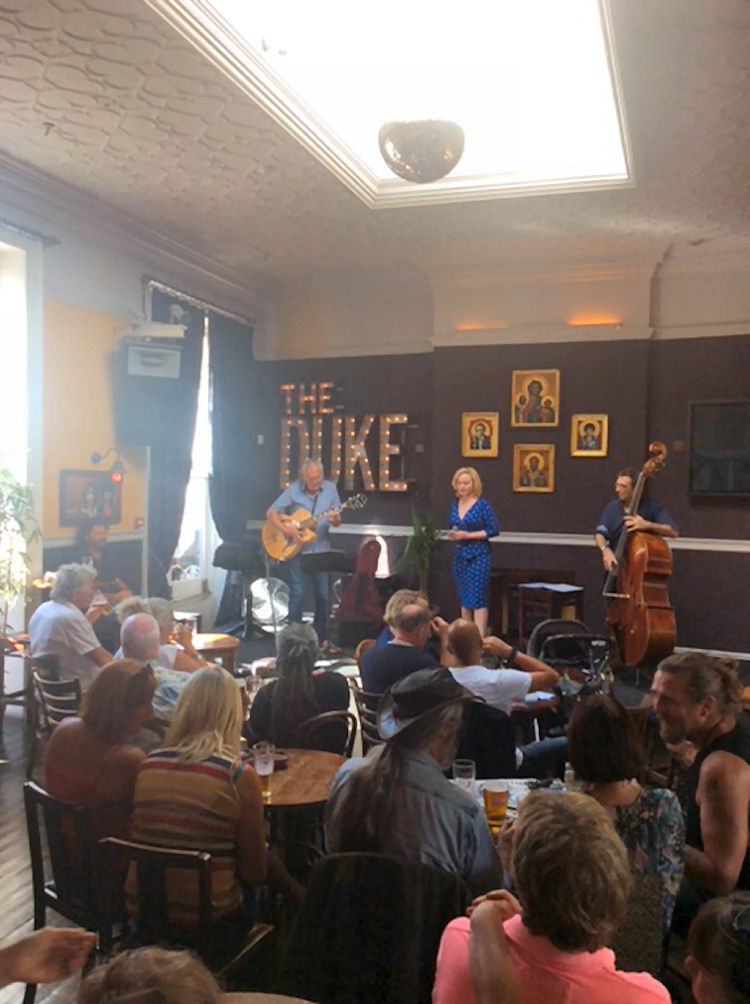
Above photo taken inside what was the pubs snooker room, and sent by Steve Glover, August 2017. |
|
From the
https://www.kentonline.co.uk By Angela Cole, 18 June 2020.
Supporting pubs across Kent with Love Your Local, Duke of Cumberland at
Whitstable.
We could be just a matter of weeks away from some pubs across Kent
and Medway opening again as the government’s lockdown restrictions
slowly begin to ease.
Despite being unable to open up, many of our much-loved locals have
been doing their bit to keep going, and continue to be the hub of their
community.
Pubs of all shapes and size have begun to diversify, and started to
open their doors for takeaways and deliveries. We want to help out pubs
and bars from all across the county and have launched our campaign, Love
Your Local.
Each week in your local KM Group newspaper, we are printing free
adverts for many of the pubs we’re promoting, to help businesses while
the doors must stay shut. We are also writing about as much of the
latest pubs news from across the county as possible. Here are some:
Whitstable's Pamela Holmes heard our cry for people to love their local
loud and clear and sent us pictures of her and her sister enjoying a
drink in pastimes at their local, The Duke of Cumberland in Whitstable
High Street.
"We miss our local pub," she said, recalling how things were: "With its
live music, the friendly staff and lovely cold beer, it's like going to
a party every week."

Pamela Holmes of Whitstable in the Duke of Cumberland pub before lockdown. |
|
From the
https://www.kentonline.co.uk By Brad Harper, 12 April 2023.
Bosses of Duke of Cumberland in Whitstable High Street to flog lifetime
of pub items ahead of departure.
The bosses of an historic pub are going to flog a lifetime of antique
treasures as they prepare to change hands.
Tony Tarrats and Sarah Smith will be hosting the massive yard sale at
the Duke of Cumberland in Whitstable High Street so customers can grab
themselves a piece of memorabilia.
The pair announced they will be leaving The Duke, which dates back more
than 300 years.
And they will be selling a range of items, including records, furniture,
radios, record players and vintage projectors.
Anyone wanting something to recall fond memories should head to the yard
sale which will be held between 11am and 4pm every day this week.
It comes after plans by Shepherd Neame to refurbish the Grade II-listed
building sparked a huge backlash from hundreds of residents at the start
of this year over fears they could lose it as a music venue.
Jenny Buncombe started a written petition before Christmas, but has
since launched an online campaign which has amassed a total of more than
2,300 signatures.
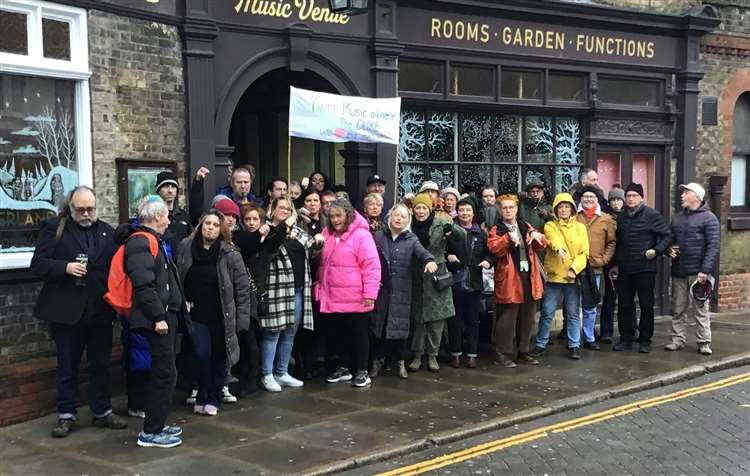
Punters gathered outside The Duke of Cumberland in Whitstable High
Street this year to show their support for the campaign. Picture: Jenny
Buncombe.
And when approached by KentOnline earlier this year, the brewery did not
confirm whether the pub would retain its music venue when asked
specifically about the matter.
But Tony and Sarah appeared to defend Shepherd Neame on the pub's social
media page earlier this year.
"The wave of support shown here for the continuation of live music at
The Duke is amazing," they said.
"The decision to leave the pub was ours not Sheps.
"In the present economic climate, they were left with little choice but
to put their financial weight behind the building.

The Duke of Cumberland is a much-loved music venue in Whitstable.
Picture: Jenny Buncombe.
"No one taking over this bar would want to lose the atmosphere on a
Sunday afternoon and it’s that positive energy that will make a
difference.
"I think there may be more support and flexibility in Sheps than you
think."
The brewery submitted plans to the city council to make changes inside
and outside the building.
Other work includes new staff accommodation and refurbishing the ground
floor – which includes fitting new seats and relocating the toilets.
Shepherd Neame’s managing director of pubs Jonathon Swaine previously
said: "We can confirm that as part of ongoing investment in our estate,
Shepherd Neame is planning to refurbish The Duke of Cumberland.
"Our plans are formative at this stage, but we are hoping to refurbish
the rooms and the interior of the pub, and have submitted a planning
application to the local authority relating to some minor alterations.
"Our aim, as with all our refurbishments, is to respect the tradition of
the pub and to enhance its individuality and unique character."
Despite the company's assurances that the future of the pub is safe,
campaigners have succeeded in having the property listed as an "asset of
community value", by the city council.
Green Party members Clare Turnbull, Keith Bothwell and Andrew Harvey
have also secured the same designation for the "Plough" in Swalecliffe.
The applications were made in response to public concern about the
number of local pubs being lost to luxury housing development.
It gives both businesses added planning protection against being closed
and redeveloped.
Originally called the "Noah's Ark," the pub was renamed
"Duke William" in
1747, before being called the "Duke of Cumberland" the following year.
A blaze swept through the building in 1866 and it was rebuilt in 1878.
|
|
From the
https://www.kentonline.co.uk By Liane Castle, 26 August 2023.
Shepherd Neame pub, The Duke of Cumberland in Whitstable, reopens after £1.8 million renovations.
A historic pub which closed for renovations has reopened after a £1.8
million revamp.
Original features, including a Grade II-listed bar, have been restored
at The Duke of Cumberland in Whitstable, which is owned by Shepherd
Neame.
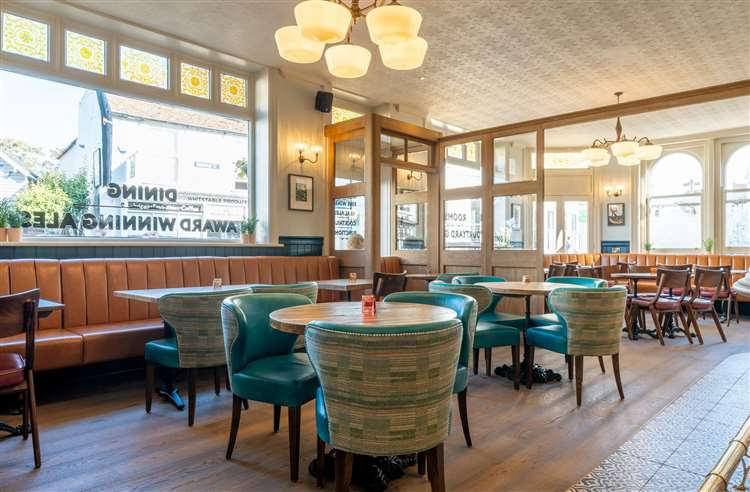
The new-look bar area. Picture: Shepherd Neame.
Work took 14 weeks to complete and the high street venue reopened on
Thursday.
As well as refurbishments to the bar and dining room, the pub’s
courtyard garden has also been transformed into a new decking area with
an outside kitchen.
A new external function room, named The Boatyard, has also been built in
the courtyard, which has its own bar and is available to book for
private events.
The venue's eight boutique hotel rooms were also updated as part of the
renovations bringing them back into use for the first time in years.
Each room is named after a historic oyster fishing vessel known as a
‘yawl’ or ‘smack’, built in the town.
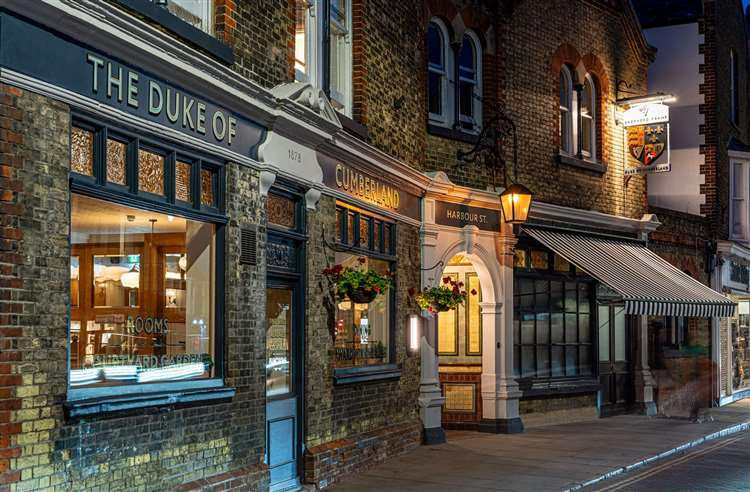
The high street venue reopened on Thursday. Picture: Shepherd Neame.
They come with a pocket-sprung mattress, drench showers and Nespresso
coffee machines in every room, along with a flat-screen Smart TV and
high-speed wifi.
The building, which dates back to 1867, also has a seafood restaurant
which uses produce caught locally.
New general manager, Tina Kennedy, has joined the venue having
previously run the the "Royal" at Tankerton for the past six years.
She said: “It is a real honour to be asked to take on the Duke of
Cumberland following this major transformation.
“It is fantastic to see Shepherd Neame making such a major investment in
the town, and I’m excited about welcoming locals and visitors to see
just what we have to offer here.”

The eight hotel rooms have reopened for the first time in years.
Picture: Shepherd Neame.
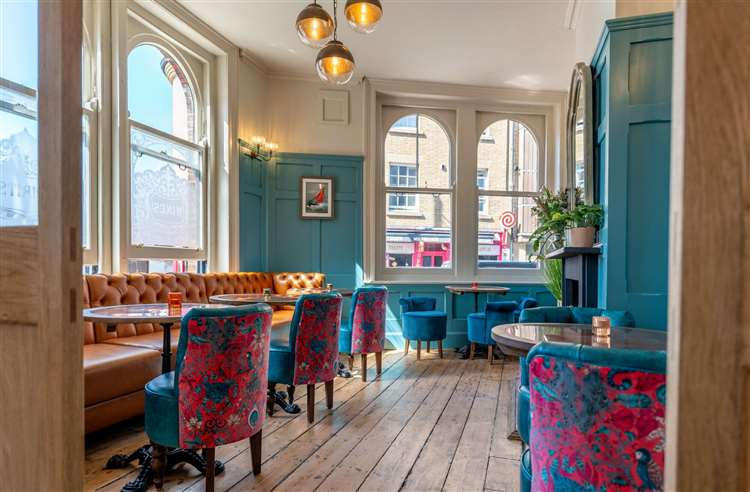
The refurbishments cost £1.8 million. Picture: Shepherd Neame.
The pub was previously renowned for its live music events, and Ms
Kennedy, who visited the pub as a teenager, plans to retain that
tradition with regular jazz, swing and acoustic evenings.
Managing director, pubs, Jonathon Swaine, said: “We are incredibly proud
to reopen The Duke of Cumberland after this extensive refurbishment
project.
“The renovation has been completed to a very high standard, and we hope
that both locals and visitors to the town will enjoy seeing the amazing
work which has been carried out to ensure such a much-loved pub
continues to be a lively local for many years to come.
“It has also been a number of years since the pub’s rooms have been
available for guests to stay in, and it has been a labour of love for
Shepherd Neame to bring them back into use.
“We look forward to welcoming guests to enjoy a relaxing stay with us.” |
LICENSEE LIST
BAILEY Abraham 1778+
KITCHENHAM/KITCHINGHAM William 1804-07+
FOREMAN Walter 1828+
 
FOREMAN Hannah 1840+

MANN Alfred 1851+ (age 32 in 1851 ) )
FOREMAN William White 1861+ (age 36 in 1861 ) )
 LESTER William 1871+ (age 53 in 1871
LESTER William 1871+ (age 53 in 1871 ) )
GURR Charles 1881-94+ (age 47 in 1891 ) )
KING Albert 1901-02+ (age 28 in 1901 ) )
KING Sarah Ann to Sept/1902

GREENSTED Charles Sept/1902+

WESTON Tryphina Maud Mrs 1910-11+ (age 43 in 1911 ) )

JOB Mrs Agnes Mary to Oct/1923

MARDEN Lionel 1930-31+
MILLEA Frank James to Dec/1935

SMITH Leslie Kempsell Dec/1935-Dec/38
TAYLOR Walter Thomas 1939 (age 94 in 1939)
GUILFOYLE ???? late 1990s

TARRATS
Tony & SMITH Sarah to 2023
 KENNEDY Tina Aug/2023+
KENNEDY Tina Aug/2023+
https://pubwiki.co.uk/DukeCumberland.shtml
 From the Pigot's Directory 1828-29 From the Pigot's Directory 1828-29
 From
the Pigot's Directory 1832-33-34 From
the Pigot's Directory 1832-33-34
 From the Pigot's Directory 1840 From the Pigot's Directory 1840
 Whitstable Times
and Herne Bay Herald Whitstable Times
and Herne Bay Herald
 Census Census
|



































